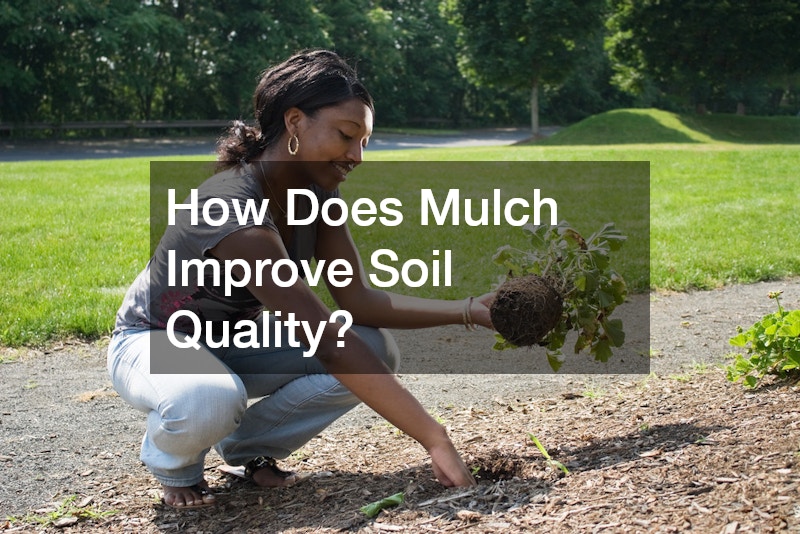Maintaining healthy soil is essential for any thriving garden or landscape and mulch plays a critical role in enhancing soil quality. Whether you are cultivating vegetables, tending to ornamental plants or managing a large-scale landscape project, understanding how mulch contributes to soil improvement can help you make informed decisions about your gardening practices. Used properly, mulch can transform the condition of the soil, providing benefits that extend beyond aesthetic appeal.
Mulch is typically a layer of organic or inorganic material placed over the soil surface. Inorganic mulches such as gravel, landscape fabric or rubber are also used, though they lack the soil-enriching properties of organic options. The process of applying mulch is relatively simple, but its impact on soil health is multifaceted and significant.
Retaining Moisture & Regulating Temperature
One of the most immediate benefits of using mulch is its ability to retain soil moisture. When soil is exposed to direct sunlight, evaporation rates increase dramatically, which can lead to water loss and stress for plants. Mulch acts as a protective barrier, reducing water evaporation and ensuring that moisture remains available to plant roots for longer periods. This is especially valuable in Australia’s often dry and sun-drenched climate, where water conservation is not only environmentally responsible but also economically prudent.
In addition to moisture retention, mulch helps regulate soil temperature. During hot days, it keeps the soil cooler by blocking harsh sunlight. Conversely, in cooler months, it provides insulation, preventing the soil from becoming too cold. This stabilised temperature range encourages consistent root growth and helps beneficial soil organisms thrive, ultimately improving the structure and fertility of the soil.
Enhancing Soil Structure and Aeration
Mulch contributes to improved soil structure, particularly when organic materials are used. As these materials decompose, they integrate with the topsoil and gradually improve its composition. Organic mulch breaks down into humus, a rich, dark organic matter that enhances the soil’s ability to hold water and nutrients. This ongoing process mimics natural forest floors, where fallen leaves and organic debris continually replenish the soil.
As mulch decomposes, it also promotes the activity of earthworms and microorganisms. Earthworms, in particular, are essential for soil health. They burrow through the soil, creating channels that increase aeration and improve water infiltration. Their waste, known as worm castings, is rich in nutrients and beneficial microbes. The microbial life that flourishes under mulch is equally important, as it aids in nutrient cycling and suppresses harmful pathogens, creating a balanced and resilient soil ecosystem.
Suppressing Weeds & Reducing Erosion
Another practical advantage of mulch is its effectiveness in suppressing weeds. By covering the soil, mulch blocks sunlight from reaching weed seeds, thereby reducing their ability to germinate and grow. Fewer weeds mean less competition for essential resources such as water, sunlight and nutrients, which allows your desired plants to flourish. This minimises the need for herbicides and manual weeding, saving time and reducing chemical use in your garden.
Mulch also plays a vital role in preventing soil erosion. When bare soil is exposed to wind or heavy rain, it is susceptible to being washed or blown away. This not only depletes the topsoil but also carries away vital nutrients. A layer of mulch protects the soil surface, reducing the impact of rainfall and wind while helping to keep soil particles in place. Over time, this results in a more stable and fertile growing environment.
Balancing Soil pH & Nutrient Levels
Depending on its composition, mulch can influence the soil’s pH and nutrient availability. For example, pine bark mulch tends to lower soil pH slightly, which can be beneficial for acid-loving plants such as blueberries and azaleas. On the other hand, mulches made from compost or manure can add nutrients such as nitrogen, phosphorus and potassium as they decompose. By carefully selecting the right type of mulch, gardeners can address specific deficiencies or imbalances in their soil.
However, it is important to monitor the effects of mulch over time. Some materials, like fresh wood chips, may temporarily deplete nitrogen from the soil as they break down. To mitigate this, many gardeners use well-composted mulch or supplement with a nitrogen-rich fertiliser during the decomposition process. Regular observation and testing will help ensure that your soil remains balanced and productive.
A Sustainable Practice for Long-Term Soil Health
Incorporating mulch into your gardening or landscaping routine is a sustainable practice that promotes long-term soil health. It reduces the need for irrigation, limits chemical interventions and supports a living soil teeming with beneficial organisms. When mulch is sourced from local or recycled materials, it also reduces waste and environmental impact, contributing to more sustainable land management.
Whether you’re a home gardener or a professional landscaper, integrating mulch into your soil care strategy is a smart, eco-friendly decision that pays off in healthier plants and more resilient landscapes.
The Power of Mulch in Soil Improvement
Mulch is an essential component in modern horticulture and landscape design, offering a range of benefits that directly enhance soil quality. From moisture conservation and temperature regulation to erosion control and nutrient enrichment, the influence of mulch is profound and far-reaching. By choosing the right mulch and applying it effectively, you can cultivate healthier soil, reduce maintenance needs and support sustainable gardening practices. Over time, this investment in soil health leads to stronger plants, higher yields and a more vibrant outdoor environment.

